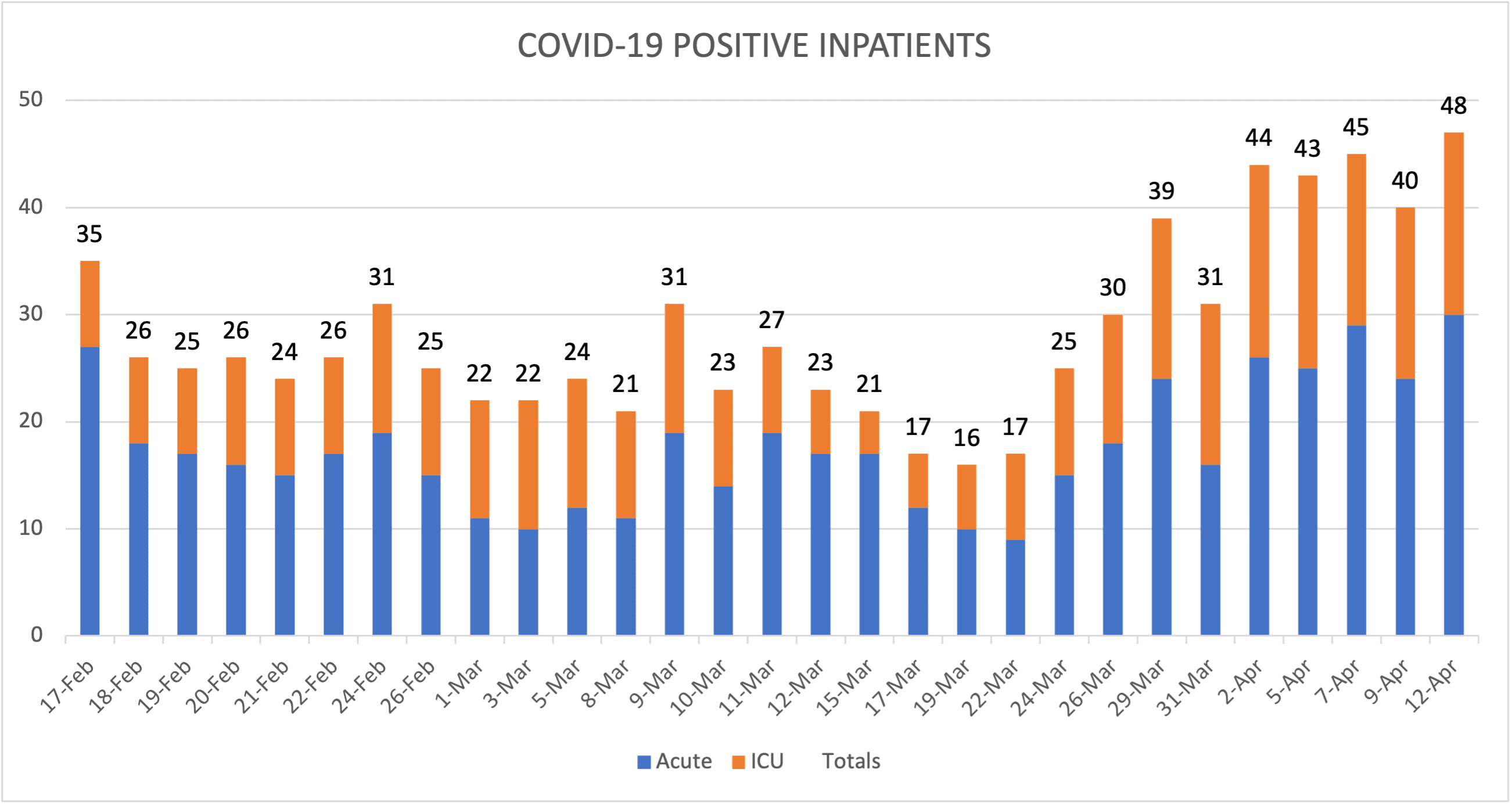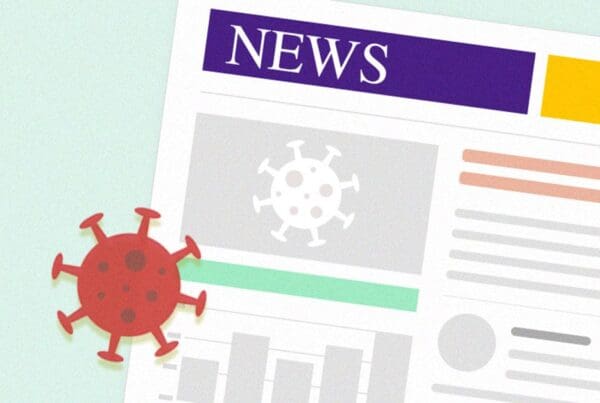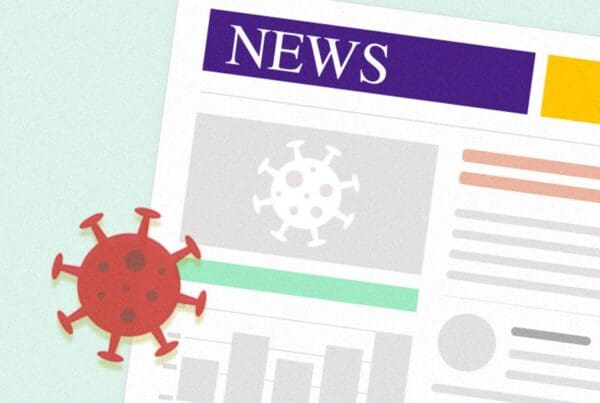Data Snapshot
UW Medicine Hospitals:

King County: The county reported 277 new positive cases and 3 new death on April 12.
Washington: The state reported 352,391 cases and 5,329 deaths as of April 11.
United States: The CDC reports 31,015,033 cases and 559,172 deaths as of April 12.
Global: WHO reports 136,291,755 confirmed COVID-19 cases and 2,941,128 deaths as of April 13.
Numbers update frequently, please follow links for most up-to-date numbers.
UW Medicine COVID-19 Vaccine Distribution Update
Total Vaccine Doses Administered: 206,602
- Total first dose: 114,817
- Total second dose: 91,785
As of April 11, 2021.
UW Medicine in the News
KOMO: Officials in King, Snohomish counties warn of joining Pierce County in Phase 2 rollback
Featuring: Tim Dellit, MD, Chief Medical Officer UW Medicine
“Health officials in King and Snohomish counties are warning they’re at risk of rolling back to Phase 2 of the state’s reopening plan if COVID-19 cases and hospitalizations continue to increase. ‘For now, we’ve leveled off near the Phase 2 cutoffs – where we go next is up to us,’ Dr. Jeffrey Duchin, health officer for Public Health – Seattle and King County, tweeted. Doctors and nurses are caring for an increasing number of COVID patients, some of whom are in intensive care, according to UW Medicine. ‘We’ve doubled the number of patients who are hospitalized from mid-March,’ said Dr. Timothy Dellit, chief medical officer for UW Medicine, ‘It’s a younger population, the average age was in their 40s, we’re seeing young people with severe disease.’”
MyNorthwest.com: Trouble with spring allergies? Put on your COVID mask, says UW doctor
Featuring: Ania Lang, MD, PhD, Allergy & Infectious Diseases
“Your COVID mask could have a second benefit besides protecting you from the coronavirus — it could help with those pesky spring allergies. Washington’s greenery makes the state beautiful, but also causes a fair amount of sniffles and sneezes for its residents. Spring allergies can begin as early as late January in the Puget Sound, but with the arrival of April comes the biggest pollen season — and it isn’t likely to let up until July. Dr. Ania Lang, an assistant professor at UW Medicine’s Allergy and Immunology Clinic, has had patients who report that some of their pollen allergy symptoms have been alleviated when they wear their masks outdoors around plants. ‘We do know that they can help,’ she said. “They cannot completely prevent your exposure because airborne particles are very prevalent, they can travel for hundreds of miles, and so it’s very difficult to be completely free of them, … but I think it could be helpful.”’
GeekWire: You got vaccinated. Now what? 7 things to know for your post-COVID vaccine behavior
Featuring: Brandon Guthrie, PhD, Epidemiology
“Why mask when vaccinated? While the science is encouraging, there is still a chance that someone who is vaccinated can contract COVID, be asymptomatic and pass it to others. But the mask habit is starting to slip for some. University of Washington epidemiologist Brandon Guthrie is part of a study that has returned repeatedly to the same mall and store entrances in King County to tally those with and without masks. The researchers have recently noticed a dip in usage among those 65 and older — which is also the population with the highest rates of vaccination. ‘It’s absolutely understandable,’ he said. ‘But we really need to keep doing the things that work [in stopping COVID], especially the things that are not that big of a deal, like wearing masks.’”
KIRO 7: UW looking for healthy volunteers for second-generation COVID-19 vaccine clinical trial
Featuring: Anna Wald, MD, MPH, Allergy & Infectious Diseases
“It is a race against time. As the country ramps up efforts to get as many Americans vaccinated as possible, some scientists are hoping to find a willing few who are not yet vaccinated. They desperately need a fresh batch of healthy volunteers to test a brand-new COVID-19 vaccine. ‘And there’s fewer and fewer of them,’ said Dr. Anna Wald, UW Medicine. ‘So we’re in a hurry to recruit.’ Wald said the trials will be held in four locations, including the University of Washington. As it happens, Seattle is no stranger to these COVID-19 vaccine trials. Volunteer Jennifer Haller was the first person in the world to receive what we now know as the Moderna vaccine at Kaiser-Permanente. And 13 months later, millions of people have got a COVID-19 vaccine. ‘So for now, we really want to make sure that we’re only enrolling people who could wait to get one of the really effective vaccines,’ said Wald. She said the new vaccine trial combines the mRNA technology used for the Moderna and Pfizer vaccines with that used for the one-dose Johnson & Johnson shot. The ultimate goal is to produce a vaccine that’s so effective we would take it only once.”
COVID-19 Literature Report
COVID-19 Literature Situation Report is a daily (M-F) newsletter put together by the Alliance for Pandemic Preparedness that provides a succinct summary of the latest scientific literature related to the COVID-19 pandemic.
Key Takeaways: COVID-19 Literature Situation Report April 12, 2021
- Emergency department visits for COVID-19 were 1.7 times higher among Hispanic and American Indian or Alaska Native persons and 1.4 times higher among Black persons, than white persons between October-December 2020, based on data from 13 US states. More.
- Compared with adults, children with SARS-CoV-2 positive nasopharyngeal swabs had lower odds of growing virus in culture and lower viral concentrations, suggesting that children may be less likely to transmit infectious virus. More.
- Monoclonal antibody treatment with bamlanivimab significantly reduced the risk of a subsequent emergency department visit or hospitalization within 30 days of a positive SARS-CoV-2 test among patients with COVID-19 (1.9% among treated vs. 12% untreated). More.
COVID-19 Literature Surveillance Team, is an affiliated group of medical students, PhDs and physicians keeping up with the latest research on SARS-CoV-2 / COVID-19 by finding the newest articles, reading them, grading their level of evidence and bringing you the bottom line.
Read the latest report: April 12 | Daily COVID-19 LST Report.
Tweet of the Week
Microbiologist Deborah Fuller @FullerLab_UW answers common vaccine questions touching on herd immunity, booster shots, do people who have had Covid-19 need the vaccine? Yes to last question. Find out more @krem2 in Spokane. @UWMedicine https://t.co/GNOgbvLqIL
— UW Medicine Newsroom (@uwmnewsroom) April 12, 2021

